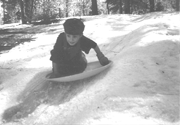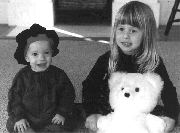


They're Here!
SURVIVING & THRIVING WHEN THE GRANDKIDS VISIT
by Dr. Lillian Carson
They're traveling over the river and through the wood to you! The anticipation
is great. You can't wait. You plan and prepare. You end up needing a vacation. Here are
some tips that prepare you for the reality and help you make the best of it. Preparation
is the key to successful visits. Young children do best when their regular routine is not
interrupted, and they don't get overstimulated or overtired. Don't impose your ideas on
your visitors. Offer suggestions, but let them decide what they want to do. If you have
tickets for an event, let them know in advance. It's something special for them to look
forward to and will help them plan. Remain flexible, and allow time for just hanging out.
That is often the most enjoyable time and provides the best quality interaction. These
tips will help you enjoy your family's visits.
Prepare Yourself:
- Remind yourself that family gatherings are going to be hectic and take a lot of energy;
get ready by being rested when they arrive.
- Get ready to put your life on hold. Keep your own social plans to a minimum; cancel such
events as your regular tennis game. Notify your friends that you're going to be busy.
- Tie up loose ends so you'll have as much free time as possible.
- If you work and can't take time off, try to arrange a lighter schedule.
- Prepare yourself for the inevitable letdown when they leave. Plan something you can look
forward to, to ease your sense of loss when the house is suddenly quiet again.
Prepare Your House:
- Take a tour of your house from the point of view of the ages of your visitors to
determine what needs to be put away.
- Childproof your house by putting away breakables. Even older children running through
the house can bump into things, so put special things in safe places.
- Keep pills and poisons, including cleaning products, out of reach.
- Put safety covers on electrical outlets for babies and toddlers.
- Eliminate dangling electric cords.
- Use folding gates if necessary to define safe space and to protect from potential
hazards such as stairs.
- Comb the house for small items that a child could swallow, such as coins or paper clips
or toys with small pieces.
- Have on hand first-aid materials and simple medications such as baby aspirin, band-aids,
antibacterial salve, thermometer, antidiarrhea preparations, ice packs.
- Help visitors feel as much at home as possible by finding out in advance what they need,
such as crib, high chair, car seat, potty, a place for diaper changing, diapers, wipes.
You can rent or borrow the furniture. Make certain that cribs, high chairs, and car seats
meet current safety standards.
- Have handy by the phone, emergency numbers for the doctor, the poison-control center, a
neighbor.
- Obtain an emergency medical release form giving you authority to authorize treatment for
a child if the parents can't be reached. (This is valuable whenever and wherever you may
babysit.)
- Do shopping in advance and have their favorite foods and snacks. Find out what their
breakfast routine includes and about special dietary needs.
Prepare For Activities:
- Inquire in advance what they might want to do. Don't assume you know.
- Plan activities for children with crayons, art projects, books, and videos.
- Create a space where they can play and do projects.
- Develop you own permanent collection of toys, books, videos, art materials, and games.
Children will remember and look forward to them.
- Make sure children have an opportunity for physical activity to burn off energy.
- Build in some alone time for each adult away from the crowd.
- Don't overschedule by making too many plans that will wear everyone out and shorten
tempers.
- Remain flexible and ready to change plans, even if you're disappointed. When you are
disappointed, don't let that spoil the visit.
- Don't promote rivalries by comparing; accept each member of the family for who she or he
is.
- Use the visit to demonstrate and teach your culture and heritage.
- If the visit includes some special meals, attempt to prepare as much as you can in
advance.
Roll With the Punches:
- Plans get changed (planes get canceled, roads get closed).
- Kids get sick.
- Your household will be disrupted, and so will you.
- Your house will get messy.
- Kids don't sit still through dinner.
- Don't criticize your children's parenting.
- Decide to have fun!
From The Essential Grandparent, by Dr. Lillian Carson. © 1996 by Dr. Lillian
Carson. Excerpted by arrangement with Health Communications, Inc. $10.95. Available in
local bookstores, or call 800-441-5569, or click here.








![]()

![]()